University Debate: Decision-Making in Healthcare (End-of-Life)
VerifiedAdded on 2022/08/21
|5
|1311
|12
Essay
AI Summary
This essay delves into the intricate process of healthcare decision-making, particularly concerning end-of-life care, and the role of advanced directives. It explores the significance of advance healthcare directives, legal documents that allow individuals to express their preferences for medical treatment if they are unable to make decisions themselves. The essay reviews literature on how these directives influence decisions regarding withholding treatment, ICU monitoring, and nutrition provision, while also highlighting barriers such as lack of awareness, unwillingness of healthcare professionals, and cultural differences. Despite serving as a means to enhance patient self-determination, the essay acknowledges the limitations of advance directives, emphasizing the need for surrogate decision-makers and physicians to interpret and apply them in complex situations. It further discusses factors such as patient age and quality of life that impact clinical decisions and the ongoing research on the effectiveness of advance directives in end-of-life care. The essay concludes by referencing several studies that support the use of advance directives and their impact on healthcare outcomes.
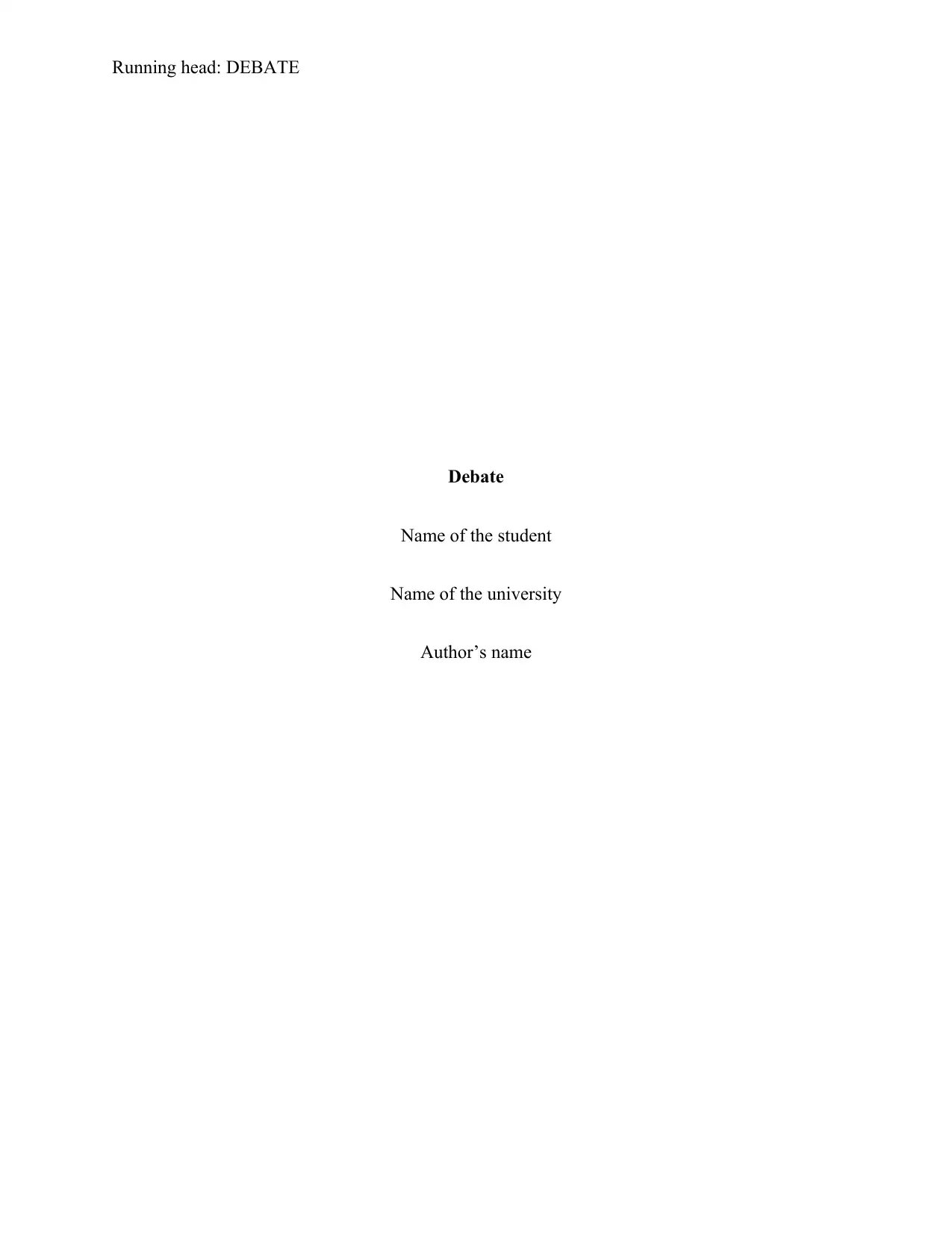
Running head: DEBATE
Debate
Name of the student
Name of the university
Author’s name
Debate
Name of the student
Name of the university
Author’s name
Paraphrase This Document
Need a fresh take? Get an instant paraphrase of this document with our AI Paraphraser
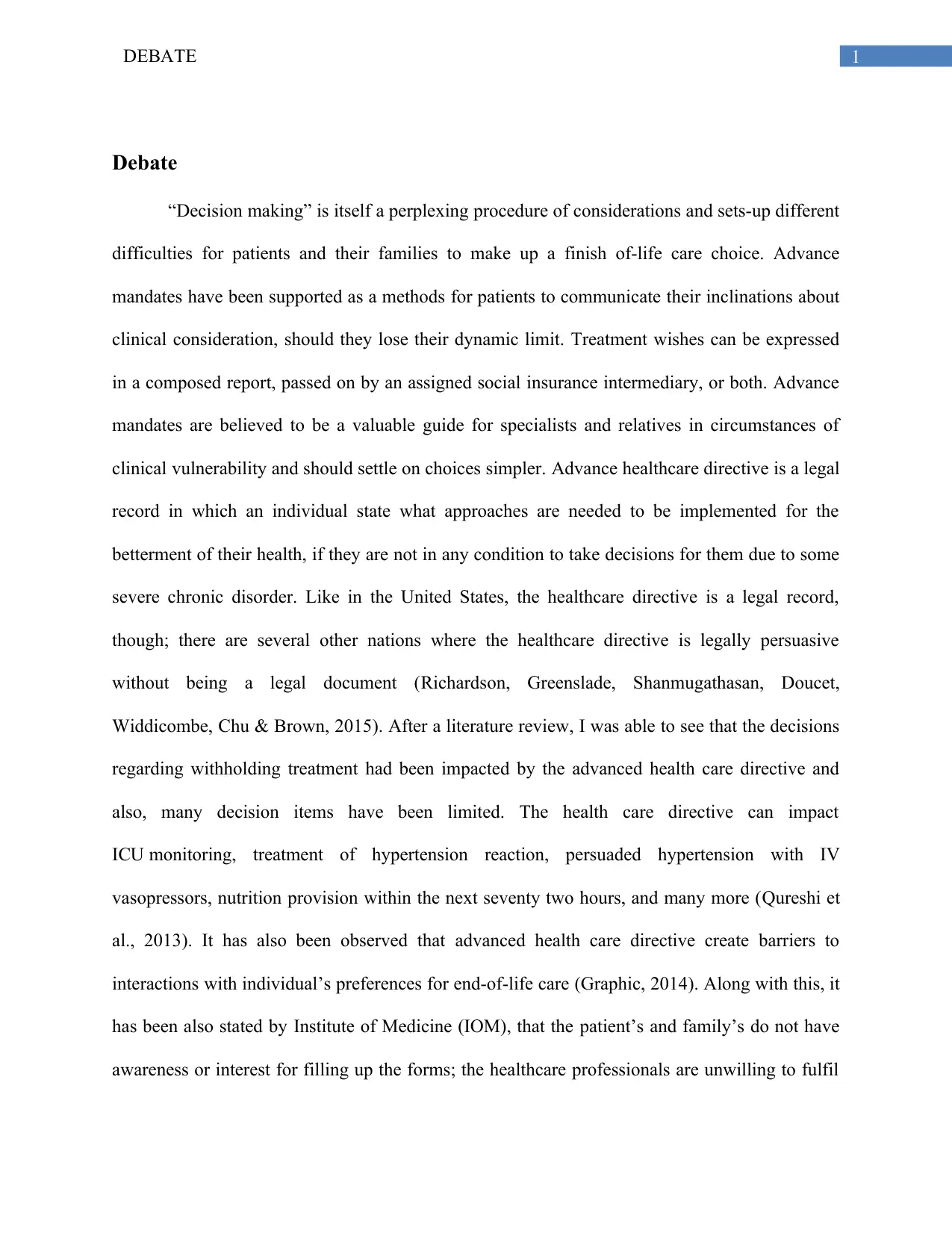
1DEBATE
Debate
“Decision making” is itself a perplexing procedure of considerations and sets-up different
difficulties for patients and their families to make up a finish of-life care choice. Advance
mandates have been supported as a methods for patients to communicate their inclinations about
clinical consideration, should they lose their dynamic limit. Treatment wishes can be expressed
in a composed report, passed on by an assigned social insurance intermediary, or both. Advance
mandates are believed to be a valuable guide for specialists and relatives in circumstances of
clinical vulnerability and should settle on choices simpler. Advance healthcare directive is a legal
record in which an individual state what approaches are needed to be implemented for the
betterment of their health, if they are not in any condition to take decisions for them due to some
severe chronic disorder. Like in the United States, the healthcare directive is a legal record,
though; there are several other nations where the healthcare directive is legally persuasive
without being a legal document (Richardson, Greenslade, Shanmugathasan, Doucet,
Widdicombe, Chu & Brown, 2015). After a literature review, I was able to see that the decisions
regarding withholding treatment had been impacted by the advanced health care directive and
also, many decision items have been limited. The health care directive can impact
ICU monitoring, treatment of hypertension reaction, persuaded hypertension with IV
vasopressors, nutrition provision within the next seventy two hours, and many more (Qureshi et
al., 2013). It has also been observed that advanced health care directive create barriers to
interactions with individual’s preferences for end-of-life care (Graphic, 2014). Along with this, it
has been also stated by Institute of Medicine (IOM), that the patient’s and family’s do not have
awareness or interest for filling up the forms; the healthcare professionals are unwilling to fulfil
Debate
“Decision making” is itself a perplexing procedure of considerations and sets-up different
difficulties for patients and their families to make up a finish of-life care choice. Advance
mandates have been supported as a methods for patients to communicate their inclinations about
clinical consideration, should they lose their dynamic limit. Treatment wishes can be expressed
in a composed report, passed on by an assigned social insurance intermediary, or both. Advance
mandates are believed to be a valuable guide for specialists and relatives in circumstances of
clinical vulnerability and should settle on choices simpler. Advance healthcare directive is a legal
record in which an individual state what approaches are needed to be implemented for the
betterment of their health, if they are not in any condition to take decisions for them due to some
severe chronic disorder. Like in the United States, the healthcare directive is a legal record,
though; there are several other nations where the healthcare directive is legally persuasive
without being a legal document (Richardson, Greenslade, Shanmugathasan, Doucet,
Widdicombe, Chu & Brown, 2015). After a literature review, I was able to see that the decisions
regarding withholding treatment had been impacted by the advanced health care directive and
also, many decision items have been limited. The health care directive can impact
ICU monitoring, treatment of hypertension reaction, persuaded hypertension with IV
vasopressors, nutrition provision within the next seventy two hours, and many more (Qureshi et
al., 2013). It has also been observed that advanced health care directive create barriers to
interactions with individual’s preferences for end-of-life care (Graphic, 2014). Along with this, it
has been also stated by Institute of Medicine (IOM), that the patient’s and family’s do not have
awareness or interest for filling up the forms; the healthcare professionals are unwilling to fulfil
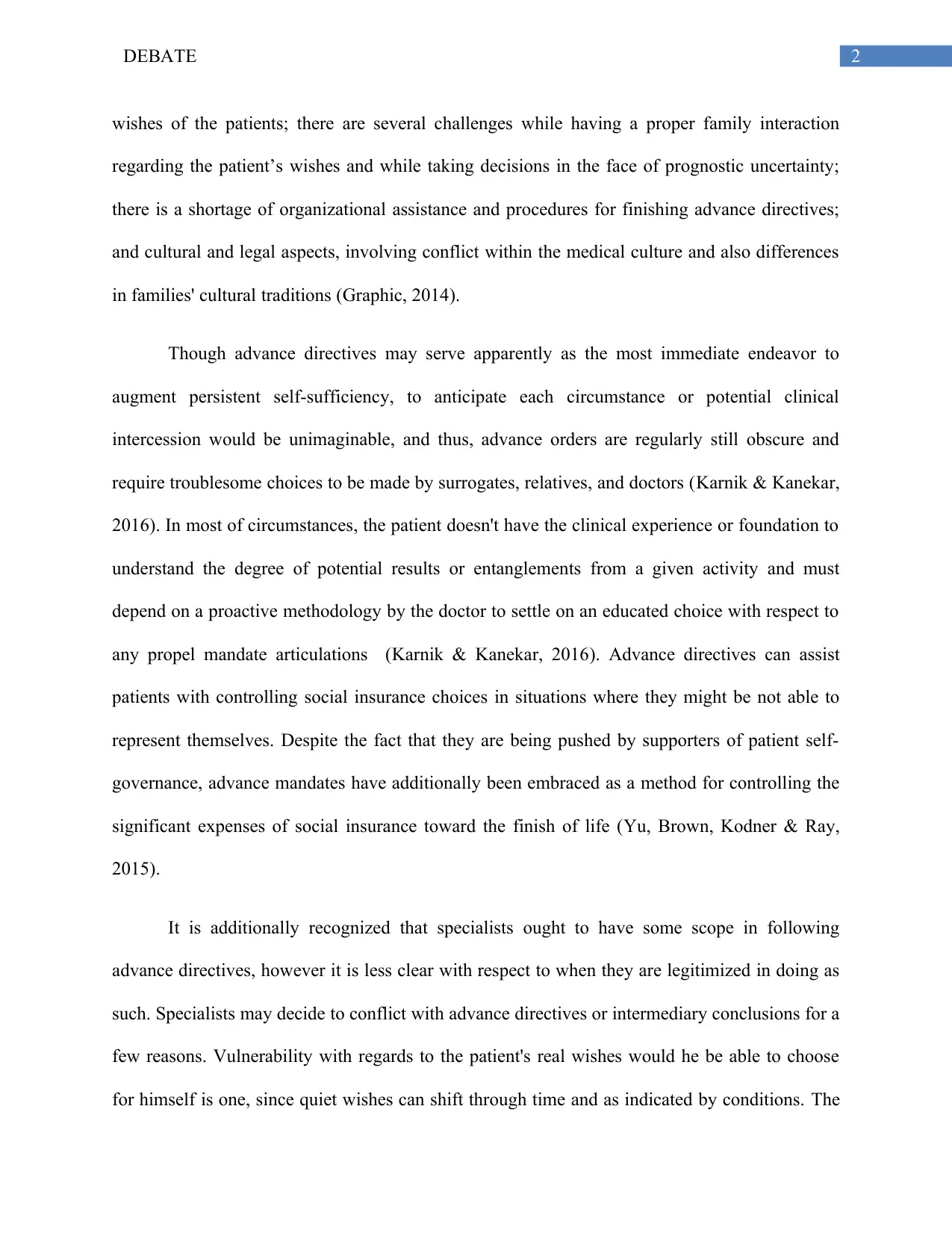
2DEBATE
wishes of the patients; there are several challenges while having a proper family interaction
regarding the patient’s wishes and while taking decisions in the face of prognostic uncertainty;
there is a shortage of organizational assistance and procedures for finishing advance directives;
and cultural and legal aspects, involving conflict within the medical culture and also differences
in families' cultural traditions (Graphic, 2014).
Though advance directives may serve apparently as the most immediate endeavor to
augment persistent self-sufficiency, to anticipate each circumstance or potential clinical
intercession would be unimaginable, and thus, advance orders are regularly still obscure and
require troublesome choices to be made by surrogates, relatives, and doctors (Karnik & Kanekar,
2016). In most of circumstances, the patient doesn't have the clinical experience or foundation to
understand the degree of potential results or entanglements from a given activity and must
depend on a proactive methodology by the doctor to settle on an educated choice with respect to
any propel mandate articulations (Karnik & Kanekar, 2016). Advance directives can assist
patients with controlling social insurance choices in situations where they might be not able to
represent themselves. Despite the fact that they are being pushed by supporters of patient self-
governance, advance mandates have additionally been embraced as a method for controlling the
significant expenses of social insurance toward the finish of life (Yu, Brown, Kodner & Ray,
2015).
It is additionally recognized that specialists ought to have some scope in following
advance directives, however it is less clear with respect to when they are legitimized in doing as
such. Specialists may decide to conflict with advance directives or intermediary conclusions for a
few reasons. Vulnerability with regards to the patient's real wishes would he be able to choose
for himself is one, since quiet wishes can shift through time and as indicated by conditions. The
wishes of the patients; there are several challenges while having a proper family interaction
regarding the patient’s wishes and while taking decisions in the face of prognostic uncertainty;
there is a shortage of organizational assistance and procedures for finishing advance directives;
and cultural and legal aspects, involving conflict within the medical culture and also differences
in families' cultural traditions (Graphic, 2014).
Though advance directives may serve apparently as the most immediate endeavor to
augment persistent self-sufficiency, to anticipate each circumstance or potential clinical
intercession would be unimaginable, and thus, advance orders are regularly still obscure and
require troublesome choices to be made by surrogates, relatives, and doctors (Karnik & Kanekar,
2016). In most of circumstances, the patient doesn't have the clinical experience or foundation to
understand the degree of potential results or entanglements from a given activity and must
depend on a proactive methodology by the doctor to settle on an educated choice with respect to
any propel mandate articulations (Karnik & Kanekar, 2016). Advance directives can assist
patients with controlling social insurance choices in situations where they might be not able to
represent themselves. Despite the fact that they are being pushed by supporters of patient self-
governance, advance mandates have additionally been embraced as a method for controlling the
significant expenses of social insurance toward the finish of life (Yu, Brown, Kodner & Ray,
2015).
It is additionally recognized that specialists ought to have some scope in following
advance directives, however it is less clear with respect to when they are legitimized in doing as
such. Specialists may decide to conflict with advance directives or intermediary conclusions for a
few reasons. Vulnerability with regards to the patient's real wishes would he be able to choose
for himself is one, since quiet wishes can shift through time and as indicated by conditions. The
⊘ This is a preview!⊘
Do you want full access?
Subscribe today to unlock all pages.

Trusted by 1+ million students worldwide
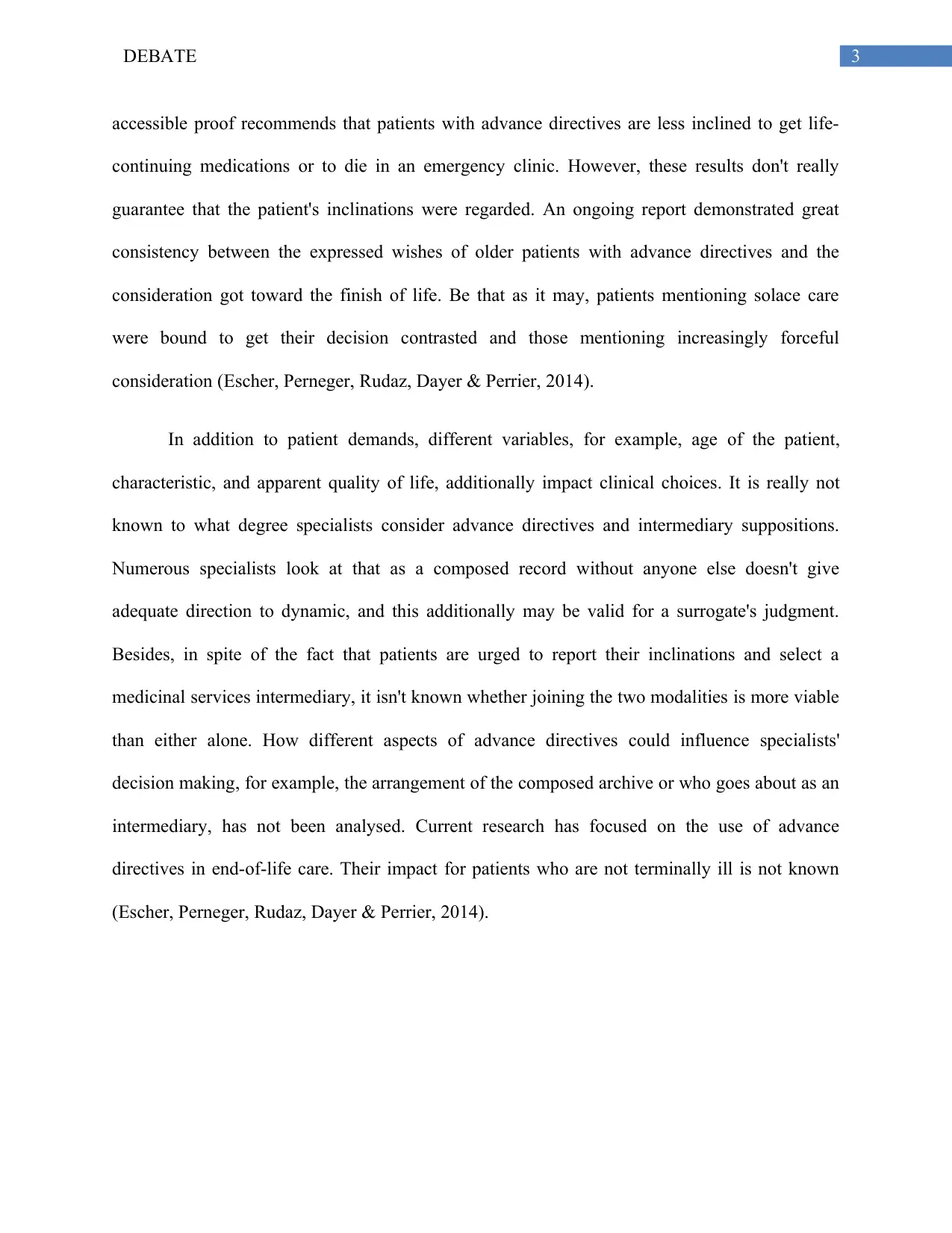
3DEBATE
accessible proof recommends that patients with advance directives are less inclined to get life-
continuing medications or to die in an emergency clinic. However, these results don't really
guarantee that the patient's inclinations were regarded. An ongoing report demonstrated great
consistency between the expressed wishes of older patients with advance directives and the
consideration got toward the finish of life. Be that as it may, patients mentioning solace care
were bound to get their decision contrasted and those mentioning increasingly forceful
consideration (Escher, Perneger, Rudaz, Dayer & Perrier, 2014).
In addition to patient demands, different variables, for example, age of the patient,
characteristic, and apparent quality of life, additionally impact clinical choices. It is really not
known to what degree specialists consider advance directives and intermediary suppositions.
Numerous specialists look at that as a composed record without anyone else doesn't give
adequate direction to dynamic, and this additionally may be valid for a surrogate's judgment.
Besides, in spite of the fact that patients are urged to report their inclinations and select a
medicinal services intermediary, it isn't known whether joining the two modalities is more viable
than either alone. How different aspects of advance directives could influence specialists'
decision making, for example, the arrangement of the composed archive or who goes about as an
intermediary, has not been analysed. Current research has focused on the use of advance
directives in end-of-life care. Their impact for patients who are not terminally ill is not known
(Escher, Perneger, Rudaz, Dayer & Perrier, 2014).
accessible proof recommends that patients with advance directives are less inclined to get life-
continuing medications or to die in an emergency clinic. However, these results don't really
guarantee that the patient's inclinations were regarded. An ongoing report demonstrated great
consistency between the expressed wishes of older patients with advance directives and the
consideration got toward the finish of life. Be that as it may, patients mentioning solace care
were bound to get their decision contrasted and those mentioning increasingly forceful
consideration (Escher, Perneger, Rudaz, Dayer & Perrier, 2014).
In addition to patient demands, different variables, for example, age of the patient,
characteristic, and apparent quality of life, additionally impact clinical choices. It is really not
known to what degree specialists consider advance directives and intermediary suppositions.
Numerous specialists look at that as a composed record without anyone else doesn't give
adequate direction to dynamic, and this additionally may be valid for a surrogate's judgment.
Besides, in spite of the fact that patients are urged to report their inclinations and select a
medicinal services intermediary, it isn't known whether joining the two modalities is more viable
than either alone. How different aspects of advance directives could influence specialists'
decision making, for example, the arrangement of the composed archive or who goes about as an
intermediary, has not been analysed. Current research has focused on the use of advance
directives in end-of-life care. Their impact for patients who are not terminally ill is not known
(Escher, Perneger, Rudaz, Dayer & Perrier, 2014).
Paraphrase This Document
Need a fresh take? Get an instant paraphrase of this document with our AI Paraphraser
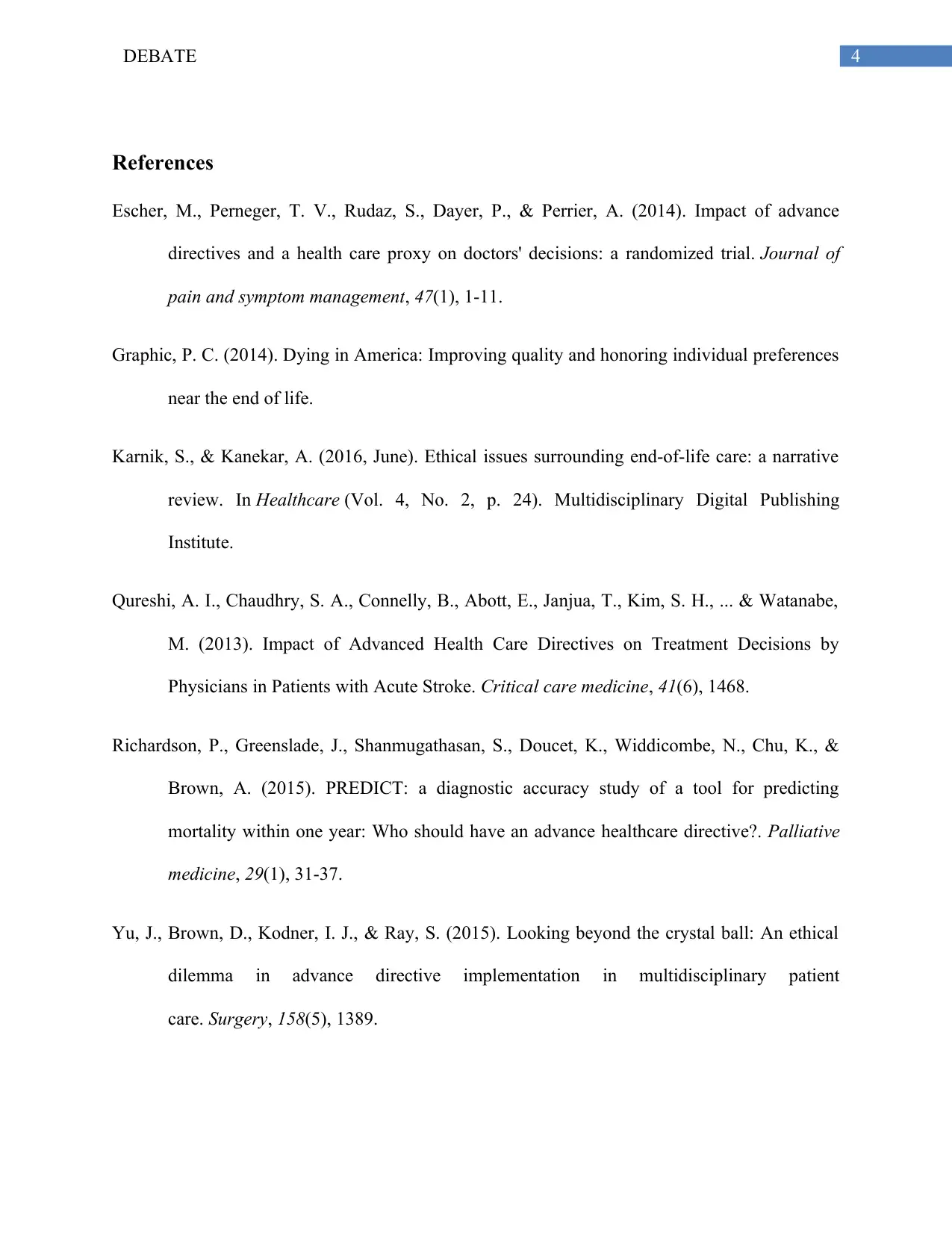
4DEBATE
References
Escher, M., Perneger, T. V., Rudaz, S., Dayer, P., & Perrier, A. (2014). Impact of advance
directives and a health care proxy on doctors' decisions: a randomized trial. Journal of
pain and symptom management, 47(1), 1-11.
Graphic, P. C. (2014). Dying in America: Improving quality and honoring individual preferences
near the end of life.
Karnik, S., & Kanekar, A. (2016, June). Ethical issues surrounding end-of-life care: a narrative
review. In Healthcare (Vol. 4, No. 2, p. 24). Multidisciplinary Digital Publishing
Institute.
Qureshi, A. I., Chaudhry, S. A., Connelly, B., Abott, E., Janjua, T., Kim, S. H., ... & Watanabe,
M. (2013). Impact of Advanced Health Care Directives on Treatment Decisions by
Physicians in Patients with Acute Stroke. Critical care medicine, 41(6), 1468.
Richardson, P., Greenslade, J., Shanmugathasan, S., Doucet, K., Widdicombe, N., Chu, K., &
Brown, A. (2015). PREDICT: a diagnostic accuracy study of a tool for predicting
mortality within one year: Who should have an advance healthcare directive?. Palliative
medicine, 29(1), 31-37.
Yu, J., Brown, D., Kodner, I. J., & Ray, S. (2015). Looking beyond the crystal ball: An ethical
dilemma in advance directive implementation in multidisciplinary patient
care. Surgery, 158(5), 1389.
References
Escher, M., Perneger, T. V., Rudaz, S., Dayer, P., & Perrier, A. (2014). Impact of advance
directives and a health care proxy on doctors' decisions: a randomized trial. Journal of
pain and symptom management, 47(1), 1-11.
Graphic, P. C. (2014). Dying in America: Improving quality and honoring individual preferences
near the end of life.
Karnik, S., & Kanekar, A. (2016, June). Ethical issues surrounding end-of-life care: a narrative
review. In Healthcare (Vol. 4, No. 2, p. 24). Multidisciplinary Digital Publishing
Institute.
Qureshi, A. I., Chaudhry, S. A., Connelly, B., Abott, E., Janjua, T., Kim, S. H., ... & Watanabe,
M. (2013). Impact of Advanced Health Care Directives on Treatment Decisions by
Physicians in Patients with Acute Stroke. Critical care medicine, 41(6), 1468.
Richardson, P., Greenslade, J., Shanmugathasan, S., Doucet, K., Widdicombe, N., Chu, K., &
Brown, A. (2015). PREDICT: a diagnostic accuracy study of a tool for predicting
mortality within one year: Who should have an advance healthcare directive?. Palliative
medicine, 29(1), 31-37.
Yu, J., Brown, D., Kodner, I. J., & Ray, S. (2015). Looking beyond the crystal ball: An ethical
dilemma in advance directive implementation in multidisciplinary patient
care. Surgery, 158(5), 1389.
1 out of 5
Related Documents
Your All-in-One AI-Powered Toolkit for Academic Success.
+13062052269
info@desklib.com
Available 24*7 on WhatsApp / Email
![[object Object]](/_next/static/media/star-bottom.7253800d.svg)
Unlock your academic potential
Copyright © 2020–2026 A2Z Services. All Rights Reserved. Developed and managed by ZUCOL.





